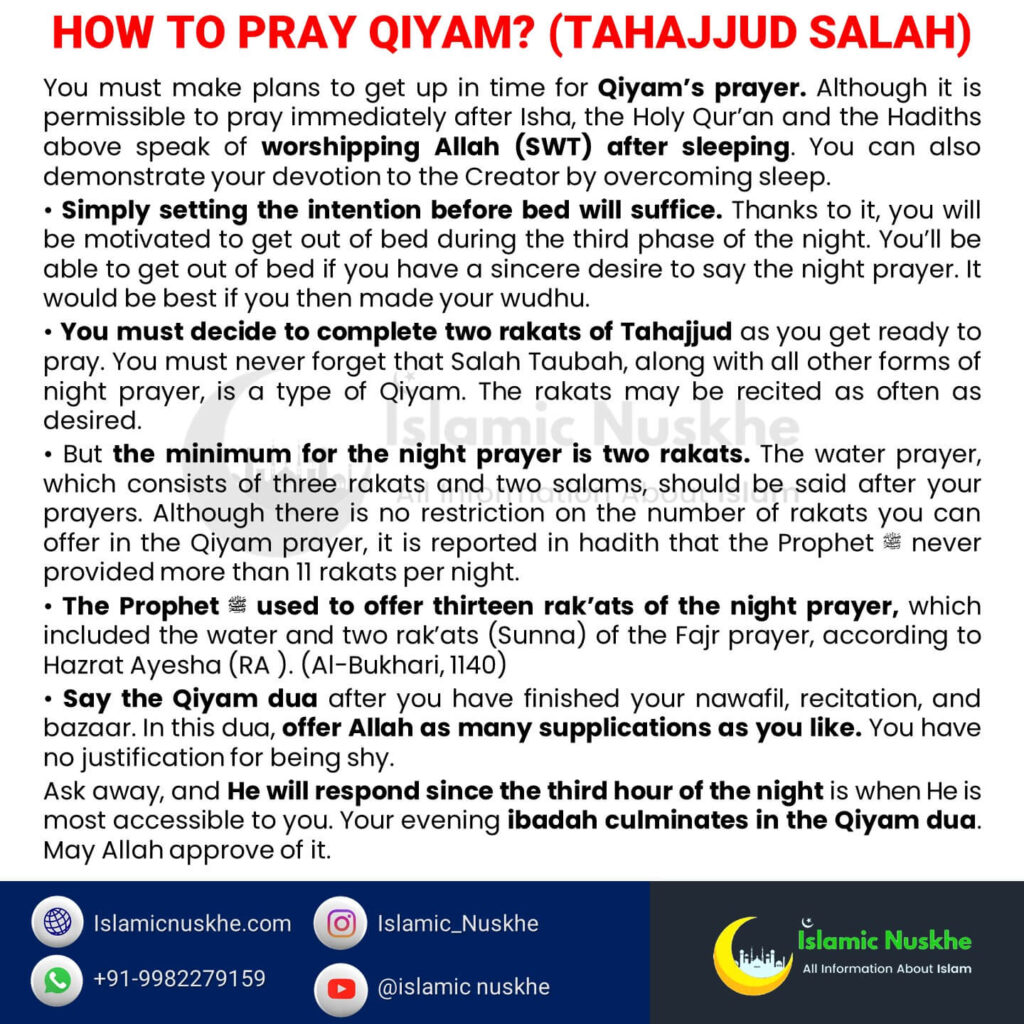Can you think back to times when your desire for something was so intense that you would constantly make dua to Allah in the hopes of achieving it?
The prayer may be offered for the benefit of well-being, forgiveness, or alleviation of your and your loved ones’ present-day difficulties.
We all find ourselves making the dua that is most dear to our hearts.
The subject of today’s post is intriguing since I’ll explain to my readers “How to pray Qiyam” so that their wishes come true.
Understanding qiyam’s Importance in Islam
Due to his kindness, Allah has established Qiyam as the most suitable prayer for us to make our dua to Him.
Each of us has a particular prayer that we want God to answer.
We must get up in the middle of the night and pray to God, pleading with Him to grant us our heart’s desire for our specific petition to be answered.
Although Allah SWT gives us a chance to pray at any hour of the day, the night prayer gives us a particular window of opportunity when our petition is most likely to be heard.
We are free to indulge in whatever we want in the final portion of the evening.
Prophet Muhammad (ﷺ) is reported to have said:
“The night prayer is the next best prayer after the required prayers.”
[Sahih Muslim]
One of my favorite Nafli, or voluntary, prayers is Qiyam. It not only gives me tranquility, but it also helps me remain humble.
Not to mention the significance Allah has assigned to Qiyam, Allah spoke to those who pray at night in the Holy Qur’an, saying,
“You who cover yourself with garments, get up in the middle of the night to pray, but only for half of it, or add a little to it, or take a little away from it, and read the Qur’an in proportion.”
(Muammil Surah: 1-4)
There is a significant reward for those who pray at night since Allah speaks directly to them.
Even if late-night prayer to Allah (SWT) is optional, it comes with benefits one should work toward.
In addition to the reward, I enjoy Qiyam because it teaches me perseverance under pressure.
My Qiyam prayer rakats came in handy during extreme suffering and poverty.
You have arrived at the right place if you are thinking of praying, Qiyam. Here, we’ll discuss the Qiyam prayer’s advantages, Sunnah, significance, and more.
Describe Qiyam:
It is known as Qiyam or Qiyamullail to spend the entire night praying. In Arabic, Qiyam means “to stand,” while lail or Layl signifies “the night.”
Although Qiyam is a fundamental component of Juz of Salah, it is utilized here as an acronym for Qiyam (also spelled as Qiyam ul Layl), which refers to standing in the worship of Allah to express prayer at night.
“The Prophet (ﷺ) used to pray at night (for such a long time) that his feet used to fracture, according to Hazrat Ayesha (RA).”
(Al-Bukhari, 4837)
What Situations Call for Qiyam?
“Pray with it as additional [worship] for you from [part of] the night; it is believed that your Lord will raise you to a station of praise.”
(Al Isra 17:79)
Any time of night can be used for qiyam. Set aside some time for Qiyam after midnight, however.
It is recommended to offer the Tahajjud salah in Qiyam in the latter third of the night or at least one hour before the Fajar prayer.
READ THE IMPORTANCE OF HALAL AND HARAM IN ISLAM
What Differs Tahajjud and Qiyam, Specifically?
The Nafil prayer Muslims perform after awakening from sleep at night is known as tahajjud. One must awaken from sleep to offer Tahajjud prayers. For Qiyam, however, there is no such limitation.
Additionally, the term “Qiyam” can refer to various nighttime prayers, such as zikr, the reading of the Holy Qur’an, and nafil rakats of salah.
As a result, even though the Tahajjud prayer is a component of Qiyam, they are different.
To benefit from both Ibadahs, we advise waking up after midnight, performing Tahajjud, and performing additional zikr. The amount of zikr is entirely up to you.
Interestingly, the fundamental distinction between the two is made during Ramadan, when the prayer after Isha is called Qiyam or Tarawih.
On the other side, one must first get some rest to pray Tahajjud.
How To Pray Qiyam? (Tahajjud Salah)
You must make plans to get up in time for Qiyam’s prayer. Although it is permissible to pray immediately after Isha, the Holy Qur’an and the Hadiths above speak of worshipping Allah (SWT) after sleeping. You can also demonstrate your devotion to the Creator by overcoming sleep.
- Simply setting the intention before bed will suffice. Thanks to it, you will be motivated to get out of bed during the third phase of the night. You’ll be able to get out of bed if you have a sincere desire to say the night prayer. It would be best if you then made your wudhu.
- You must decide to complete two rakats of Tahajjud as you get ready to pray. You must never forget that Salah Taubah, along with all other forms of night prayer, is a type of Qiyam. The rakats may be recited as often as desired.
- But the minimum for the night prayer is two rakats. The water prayer, which consists of three rakats and two salams, should be said after your prayers. Although there is no restriction on the number of rakats you can offer in the Qiyam prayer, it is reported in hadith that the Prophet (ﷺ) never provided more than 11 rakats per night.
- The Prophet (ﷺ ) used to offer thirteen rak’ats of the night prayer, which included the water and two rak’ats (Sunna) of the Fajr prayer, according to Hazrat Ayesha (RA ). (Al-Bukhari, 1140)
- Say the Qiyam dua after you have finished your nawafil, recitation, and bazaar.
In this dua, offer Allah as many supplications as you like. You have no justification for being shy.
Ask away, and He will respond since the third hour of the night is when He is most accessible to you. Your evening ibadah culminates in the Qiyam dua. May Allah approve of it.

READ Ya Hayyu Ya Qayyum Birahmatika Astaghees (Meaning and Benefits)
Why Pray Qiyam: Benefits of Qiyam Prayer
“Indeed, your Lord is aware that you and several others with you remain in prayer for nearly two-thirds of the night, or about half of it or a third of it as well, in the Qur’an.”
(73:20)
You may be wondering why we should conduct Qiyam at this point. The Sunnah of the Prophet Muhammad (ﷺ) is the essential book for all of humanity, according to the first argument.
He has taught us that to succeed in life; we must develop and enhance our relationship with Allah. As a result, the following advantages of Qiyam prayer are possible:
Success is one of Qiyam’s key advantages.
Allah declares:
“So that your Lord can raise you to a position deserving of glory and praise, and as for the night, keep awake for a portion of it since it is an additional prayer for you.”
(Surah al-Israa:79)
- The fact that Qiyam is the best prayer after the required prayers is another powerful motivator to practice it. The most meritorious prayer after the required prayers, according to a narrative by Abu Hurairah (RA)
“The pursuit of closer proximity to the Almighty is the only justification for praying Qiyam.”
(Tirmidhi: 438)
- According to Al-Qasim bin Dinar Al-Kufi (RA), who mentions this in Tirmidhi: 3549, “Ishaq bin Mansur (RA) recounted that the Holy Prophet (ﷺ) said that the virtuous used to conduct Qiyam as a habit before us and that it draws us nearer to Allah while at the same time atoning for our sins.
- Pray, Qiyam, to make you closer to Allah. Make an effort to stand up and say a prayer. Go beyond your desires. In the Qur’an, Allah declares:
“And we will undoubtedly direct those who work hard for our cause to our paths.” Indeed, Allah is with the muhsinoon (doers of good)”. (Qur’an, 29:69)
“The Mujahid” (one who struggles in Allah’s cause) is, according to the Prophet (peace be upon him),
“The person who struggles against himself to please Allah.”
(Al-Sahihah, Al-Tirmidhi 549)
- You should regret missing Qiyam. Missing this fantastic opportunity to earn rewards and Allah’s pleasure is something one should regret. In the Qur’an, Allah declares:
“You who believe, come!” Fear Allah, and do what is required of you. And let everyone dread Allah and consider what they have sent out for the future. Allah is fully aware of whatever you do”.
(Qur’an, 59:18)
In addition, he (peace be upon him) stated: “There are knots on him when a guy from my Ummah wakes up to pray at night, struggling against himself to get up and purify himself.” (Sahih Al-Targheeb, Musnad Ahmad, no. 627)

- One knot is undone as he uses wudu to wash his hands. Another knot is untied while he wipes his face. Another knot is cut when he wipes his head.
- He cuts loose another knot by washing his feet. Then Allah says, “Look at this slave of Mine; he is battling against himself and begging of Me” to those who are shrouded (in the unseen). Whatever my slave requests from me is his.
- Given the foregoing, it is evident that offering Qiyam prayer rakats can lead to great success in both this life and the next. The more willingly you stand in the middle of the night for Allah, the more confident you can be in his provision.
- Pursuing closer proximity to the Almighty is the only justification for praying Qiyam. The prayer is regarded as the best act because it is performed in secret (as it is at night). No show or ego is involved in Qiyam; its sole purpose is to receive Allah’s blessings.
Allah responds to our duas, rewards sawab, and makes our obstacles simple for us as a reward for our submission and supplication. Pursuing closer proximity to the Almighty is the only justification for praying Qiyam.
Through the night prayers, we not only get to profit from the forgiveness of our sins but also expect to grow closer to God. There is, therefore, no better justification to begin praying Qiyam.
READ Benefits of Reciting Surah Talaq Ayat (VERSE) No.2 And 3
Significant of pray Qiyam
The Meccan period established Qiyam-ul-layl, which includes voluntary salah and other kinds of prayer like zikr. The Qur’an makes many references to the meaning of Qiyam-ul-layl:
“Keep watch for it during some of the night as an additional prayer for you; perhaps your Lord will elevate you to a praised position.”
(Al Israa, 17:79)
Surah Muzzamil emphasizes the significance of Tahajjud in the life of a Muslim further:
“O you clothed (as the Prophet Muhammad saw)! With a few exceptions, stand to pray all night long.
Either half of it, a bit more, a little less, and speak the Qur’an slowly and in a nice tone. Undoubtedly, we’ll provide an important message to you (i.e., obligations and laws).
Waking at night for Tahajjud prayer is indeed difficult, powerful, beneficial for self-government, and most appropriate for learning the Qur’an”.
(Al Muzzamil ,73:1–6)
This brings to light that Qiyam-ul-lay is one of the genuinely auspicious occasions for Muslims to invoke their Creator and Lord.
Qiyam was referred to by Hazrat Jibreel (AS) as “sharaf-al mumineen,” or the moral uprightness of the believers.
As a result, Qiyam offers the human race immense wonders and chances that are available to every one of us.
Without our awareness, the night prayer and its blessings transcend and influence our daily lives.
Being a worldwide teacher for humanity was the Prophet Muhammad’s (ﷺ) most significant test, and he aced it.
His achievement did not come about suddenly. The Prophet (ﷺ) was required to perform the night prayers, or Qiyam ul-lay, throughout the initial stages of his prophethood (SWT).
We must strengthen and develop our relationship with Allah (SWT) in as many ways as our Prophet (ﷺ) instructed through his Sunnah if we are to pursue growth and prosperity in our lives. The Holy Prophet (ﷺ) claims:
“You should perform the qiyaam al-lay prayer because it was the custom of the virtuous people who came before you; it draws you nearer to your Lord, atones for sins, and stops wrongdoing.”
(Al Tirmidhi, 3549)
Frequently asked questions
A lot of people have questions. These are as follows.
What is the Qiyam recitation?
During Islamic prayer, most of the Qur’an is recited while the worshipper is in qiy’m. Al-Fatiha, the opening verse of the Qur’an, is recited standing up.
Qiyam has how many rakats?
Any two rakaat (minimum) of Sunnah prayer that is said with the goal of observing the Qiyam after the completion of the Isha prayer is referred to as the Qiyam.
Do you pray frequently for Qiyam?
Although there is no restriction on the number of rakats you can offer in the Qiyam prayer, it is reported in hadith that the Prophet (ﷺ) never provided more than 11 rakats per night.
Say the Qiyam dua after you have finished your nawafil, recitation, and bazaar. In this dua, offer Allah as many supplications as you like.
Special note:
The best thing you can do is incorporate Qiyam into your everyday regimen.
The night prayer may be offered daily to obtain Allah’s grace and draw closer to Him; you do not need to wait until the holy month of Ramadan in 2022 to perform it.
Remember that Allah values frequent acts of worship because they bring you closer to Him.
Need Any Help Contact our Molana Ashif Ali Khan.

Maulana Ashif Ali Khan is considered one of the best Islamic scholars in the world. This Report is supported by Google search results when searching for the “Best Maulana in the world.” With 35 years of experience solving various life problems, he has successfully resolved thousands of cases. Success stories of individuals he has helped can be found on our Instagram account.

